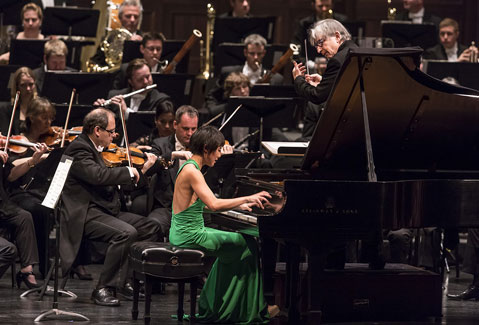Review: London Symphony Orchestra at the Granada Theatre
CAMA Sponsored a Spectacular Return to S.B. on March 25

The London Symphony Orchestra played Santa Barbara for the first time in four decades Wednesday night. And judging by the quality of the music making, man, have we been missing out.
Led by veteran maestro Michael Tilson Thomas, who celebrated his 70th birthday in December, the virtuosic ensemble sounded absolutely spectacular. The CAMA-sponsored concert at the Granada Theatre featured three 20th-century masterpieces, and each performance proved deeply affecting.
While some conductors get more idiosyncratic or mannered as they grow older, Thomas, the longtime music director of the San Francisco Symphony, seems to be moving in the opposite direction. Taking advantage of the London orchestra’s pure, rich sound, his performances were self-effacing and acutely in touch with each composer’s style.
In the “Four Sea Interludes” from Benjamin Britten’s opera Peter Grimes, which opened the program, he brought out the music’s inherent drama without resorting to exaggerated tempos or dynamics. It seemed particularly right to hear this sublime evocation of the beauty and ferocity of the ocean sitting a mile or so from the shore.
George Gershwin’s Piano Concerto, which followed, was arguably the highlight of the evening. Soloist Yuja Wang — a welcome regular visitor to Santa Barbara — is known for her dazzling virtuosity, and that quality was certainly on display, particularly in the Carmen fantasy she played as an encore. But in a sign of the 28-year-old’s growing maturity, she didn’t just blast through the Gershwin. While she clearly had the requisite power (and then some) to bring home the fast, stride-influenced passages, her performance of the slower sections was nuanced and subtle. Under Thomas’s expert guidance, the orchestra gave the piece the jazzy, distinctively American sound Gershwin demands. The delicate, bluesy interlude that opens the slow movement was a particular delight.
The program closed with Dmitri Shostakovich’s landmark Fifth Symphony. Famously written as a “response to just criticism” — the composer displeased Stalin with his cheeky, satirical early music, and he was faced with the possibility of being sent to Siberia, or worse — it’s a conventionally structured work but an emotionally ambiguous one. Once again admirably avoiding distortion or exaggeration, Thomas brought out the ominous sense of foreboding of the opening movement, which no doubt reflected the composer’s state of mind. The fierce scherzo that followed felt like a mad dance — an evocation of a formal ball as seen through a fun-house mirror.
The slow movement is one of Shostakovich’s greatest mournful adagios. Full of hushed, haunting passages featuring unexpected combinations of instruments, it felt positively otherworldly — as if time were standing still. Conductors tend to disagree about how to approach the final movement. Should it be joyful and celebratory, which, after all, was the composer’s state-issued mandate, or should they bring out the darkness and despair underneath? Either choice is valid, but too often those who choose the latter path use lethargic tempos, robbing the music of its dramatic force. Thomas threaded the needle beautifully. Like his mentor, Leonard Bernstein, he kicked it off with explosive energy, but the final bars were slower and more deliberate sounding, more cautionary than cathartic. In his hands, the music expressed not happiness per se, but rather the struggle to find happiness. Like pretty much every moment of this memorable concert, it seemed precisely right.



